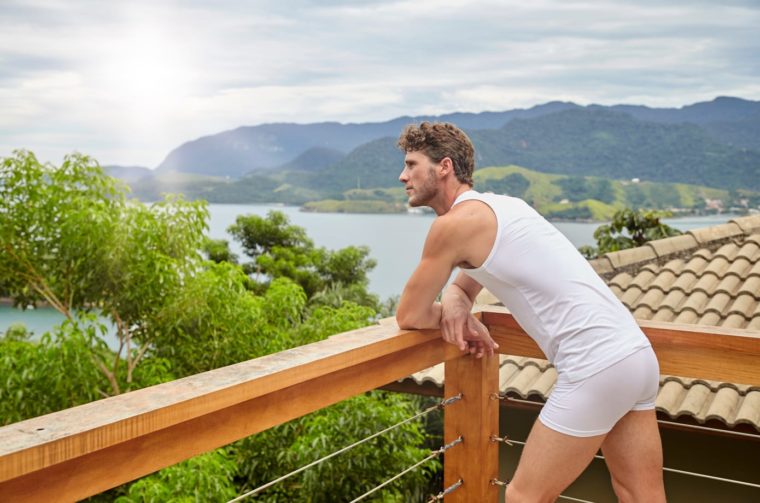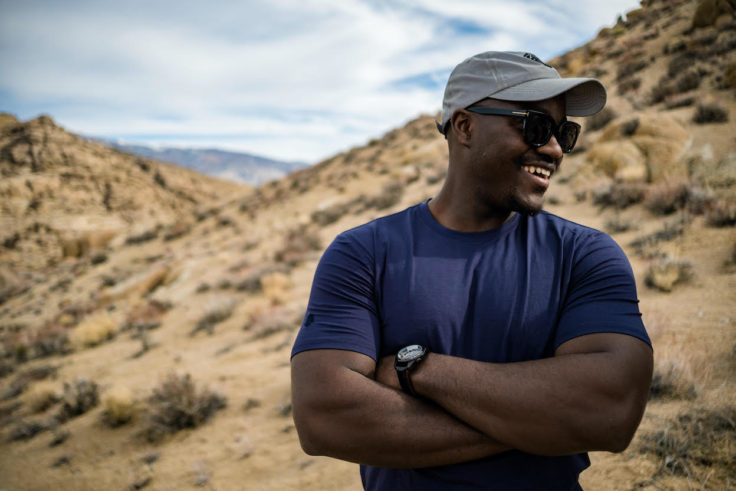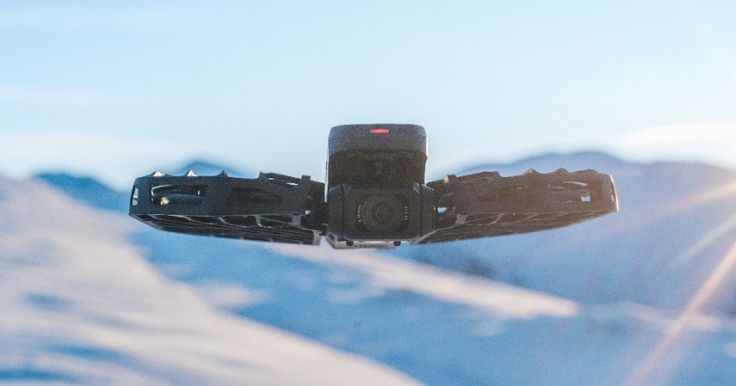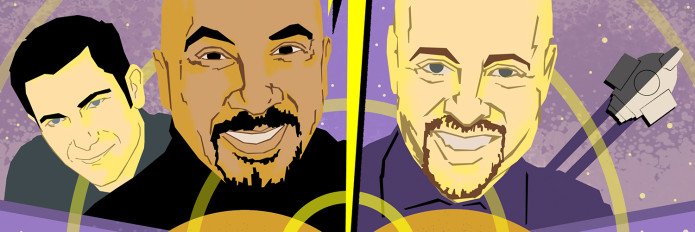We recently caught up with Wenceslaus Muenyi, the brains behind HercLéon’s odor-resistant fabrics, in an in-depth Q&A.
It’s a fact of life: clothes smell bad if you don’t wash them frequently. But what if you could engineer odors out of the equation? Wenceslaus Muenyi, the brains behind HercLéon, has cracked the code on keeping clothes odor-resistant for months by getting to the source of the problem — the fabrics themselves.
We recently caught up with Wen to discuss his research into fabrics and his wash-free garments, as well as crowdfunding as a Black campaigner. Here’s what we found out.
What’s your origin story? How did it all begin?
It all started right after I graduated college. My mom had cancer for 18 years and passed away right after I graduated, and my college girlfriend and I were going through a breakup. My life felt like it couldn’t get worse. I had a really hard time figuring out what to do next, so I decided to go to Iceland on a self-discovery trip in hopes of figuring out what was next.
On that trip, I only brought a backpack with clothes for a few days. During the week I was there, I realized two things. One, Iceland is a beautiful place; and two, sadly that my clothing was getting smelly at very different rates. My first shirt got stinky in the first few hours of wearing it, and other ones were totally fine a few days later.
During my trip I kept thinking about what made them smell at different rates and how I could make traveling lighter and easier for others who prefer not to pay the luggage fees or love living the minimalist lifestyle. When I returned home, I started doing research and fell in love with materials. I think that they’re amazing. If you put effort into learning about the characteristics of each one, you can make some really cool stuff with them.
I set out to make fabrics that wouldn’t smell bad after repeated uses. I started off with bedsheets, then I designed shirts, and now it’s underwear. That’s how I got to where I am now.
What was your process of researching different materials?
Well, thankfully we have the internet! Everything you want to know is available to you nowadays. I’ve spent a lot of time researching studies and papers and lab results.
I’ve read a lot about the rates at which bacteria grow on different materials. Synthetic fibers are very interesting. Polyester, for example, is the worst of all — not only does it not absorb liquid, it also makes your sweat sit on top of the fiber, which allows bacteria on the fibers to grow fast. That’s why if you put on a polyester shirt at the gym, it stinks almost instantly. But if you were to wear one of our shirts, you could wear it to the gym for a month straight. As long as you air it out after, you should never have a problem.
Are all of your products made from the same material then?
No, they’re totally dependent on the use. I would prefer to use strands of copper in all of my dress shirts, for example, like I do in my bedsheets and other clothing items, but that’s not always possible. People want dress shirts to be white, but copper can’t be white, it’s more of a reddish brown color, so I had to substitute it with silver fibers. Aside from color, you can apply the same principle to how the material feels. Dress shirts are expected to have a certain texture, and you can’t really make underwear feel like that; otherwise people would wonder why our underwear feels like a dress shirt! So yeah, the material I choose is very specific to the use case.
Copper and silver in underwear? Really??
Well, we use so many types of materials in our fabrics, everything from beachwood to copper to silver to spandex, for the stretchiness. The percentages will be different for each product, but those are the building blocks.
Metals like copper and silver in our fabrics are sort of our trademark. Going back to the lab tests, bacteria hates growing on copper. So for our bedsheets, we got bamboo pulp, threw in some copper and mixed it together, then turned it to a strand and wove that into more traditional fabrics.
In other instances you have to take the finished fiber and then you melt down copper or silver into a liquid then infuse them into the material. So there are many ways to get the same result. It just depends on how you want to do it and what item you’re creating.

Why did you choose crowdfunding?
I think it comes down to confidence. When I began HercLéon, I wasn’t confident enough that what I was making would be interesting or useful to anyone but me. Thankfully, crowdfunding helped me feel that my ideas were worth working on. Once my idea was validated, it helped me get the resources and the confidence I needed to get really creative.
Of course, I could’ve asked my family for help, but like Biggie Smalls said, “Money and blood don’t mix.” So I didn’t want to go to my family and end up with some feud or something! After all, I’m the youngest sibling, and my family members are reluctant to believe in my ideas because I’m the baby.
Were there any surprises that you came across while crowdfunding?
I learned not to overextend myself. For example, when it came to my bedsheets, I marketed the product to people in the USA, Canada, Mexico, the Caribbean and Australia and UK, which all have beds of the same shapes and sizes. So those sizes would work for all those countries. But then people in mainland Europe wanted to buy my bedsheets too. And I was like, yeah, I could do that.
That was a bad idea. That was stupid. As it turns out, mainland Europe barely has a standard for bedsheets. So it essentially meant making small batch sized orders! I was really dumb for doing that. I shouldn’t have done that.
Did you have a lot of interactions with your backers? What were they like?
Overall, it’s been super. The words that come to mind are supportive and empowering. People are so nice and so patient.
Of course some people are impatient. And that’s been challenging. But during another self-development trip, this time to Colombia, I learned that you have to respect yourself as much as possible. And so to me, I’m not willing to put up with disrespectful behavior for any reason, not in everyday life and not in business. So I think it’s been good that I have that mindset whenever someone is being really rude or disrespectful. I’m just like, dude, you don’t have to support this project and give them their money back as soon as possible. I don’t have time to create for people who aren’t willing to be patient to get the best quality product.
Other than that, most people have been incredibly supportive and helpful.
How has your experience as a Black man influenced how you’ve run your crowdfunding campaigns?
No matter how much I tell myself it doesn’t matter, it absolutely does. For example, most crowdfunding campaigns feature their creators in the product video. “Hey, I’m so and so, and I created this product.” That kind of thing. And I don’t do that because I’m never sure whether a person will be turned off by who I am.
I always have to wonder if potential backers will choose not to support my campaign because I’m Black. So I never show my face. That was especially true in the beginning, but I try not to get too down about it.
I find it kind of funny when I think about the people who may care about me being Black, who end up supporting my campaign without knowing that. It’s like, now you’re stuck with me! You funded my product, and you’re going to like it anyway, so what does it matter? And I don’t talk about my ethnicity or anything until the campaign is over, so if you leave, now you look bad!
Frankly, some people might have some preconceived ideas of what it means to support a minority. I don’t know. So honestly I just don’t mention my ethnicity any way whatsoever. I’m worried that it might be a negative thing, but thankfully crowdfunding has helped me raise money for my business without race ever factoring into it.
One last question. HercLéon is an interesting name. There’s got to be a story behind it, right?
It’s two things. First, I’m a huge fan of Greek mythology and Egyptian history, which have shaped the way I see the world. Second, I’m from Cameroon, which is a dual-language country (French and English).
So “Herc” is short for Hercules, which represents strength, power, and perseverance. And “Léon” is French for “lion,” which represents confidence and fierceness at the same time. Hercules is from Greek mythology, and the lion is a prominent symbol from Egyptian culture. And because I’m from Cameroon, which is a French-language country, you get HercLéon.
Basically, HercLeon is all about being strong, confident, and persistent, which is how I run my business, and how I approach the world.
To support the HercLeon, check out the Indiegogo InDemand page here.
Want to explore some other great crowdfunding campaigns? Check out some of our current favorites.



